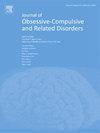Inference-based CBT versus CBT with exposure and response prevention for obsessive-compulsive disorder: The role of pre-treatment anxiety and feared consequences on treatment outcome
IF 1.5
4区 医学
Q3 PSYCHIATRY
Journal of Obsessive-Compulsive and Related Disorders
Pub Date : 2025-01-01
DOI:10.1016/j.jocrd.2025.100936
引用次数: 0
Abstract
Objective
Traditional cognitive behavioral therapy (CBT) and inference-based CBT (I-CBT) are both effective interventions for obsessive-compulsive disorder (OCD). However, only about half of the patients seem to benefit sufficiently from these treatments. This study investigated whether pre-treatment anxiety and feared consequences (of not performing compulsions) predict OCD treatment outcome and whether these potential predictors have differential effects between CBT and I-CBT.
Method
Data from a previously completed randomized controlled trial were analyzed. A total of 197 patients were randomly assigned to CBT or I-CBT. The primary outcome was OCD symptom severity, assessed with the Yale-Brown Obsessive-Compulsive Scale (Y-BOCS) at posttreatment, 6-month and 12-month follow-up. Predictors included pre-treatment anxiety, using the Beck Anxiety Inventory (BAI), and feared consequences, using the Fixity of Belief Questionnaire (FBQ), both assessed at baseline. Linear mixed models analyses were performed while controlling for Y-BOCS baseline scores.
Results
Higher BAI scores and having no feared consequences did not significantly predict higher Y-BOCS scores, nor were the effects moderated by treatment condition. A substantial 40% of participants reported having no feared consequences.
Discussion
Pre-treatment anxiety severity and feared consequences did not predict worse treatment outcomes. These findings suggest that highly anxious patients and those without feared consequences of not performing their compulsions could benefit equally from both CBT and I-CBT.
基于推理的CBT与CBT对强迫症的暴露和反应预防:治疗前焦虑和恐惧后果对治疗结果的作用
目的传统认知行为疗法(CBT)和基于推理的认知行为疗法(I-CBT)都是治疗强迫症(OCD)的有效手段。然而,只有大约一半的患者似乎从这些治疗中充分受益。本研究调查了治疗前焦虑和恐惧后果(不执行强迫行为)是否能预测强迫症的治疗结果,以及这些潜在的预测因素在CBT和I-CBT之间是否有不同的效果。方法对先前完成的随机对照试验数据进行分析。共有197名患者被随机分配到CBT或I-CBT组。主要结局是强迫症症状严重程度,在治疗后、6个月和12个月的随访中用耶鲁-布朗强迫症量表(Y-BOCS)评估。预测因子包括治疗前焦虑(使用贝克焦虑量表(BAI))和恐惧后果(使用信念固定性问卷(FBQ)),两者均在基线进行评估。在控制Y-BOCS基线评分的情况下,进行线性混合模型分析。结果较高的BAI评分和无恐惧后果并不能显著预测较高的Y-BOCS评分,也不受治疗条件的影响。多达40%的参与者报告没有担心后果。讨论治疗前焦虑的严重程度和恐惧的后果并不能预测更差的治疗结果。这些发现表明,高度焦虑的患者和那些不担心不执行强迫行为后果的患者可以从CBT和I-CBT中同样受益。
本文章由计算机程序翻译,如有差异,请以英文原文为准。
求助全文
约1分钟内获得全文
求助全文
来源期刊
CiteScore
4.00
自引率
5.60%
发文量
46
审稿时长
47 days
期刊介绍:
Journal of Obsessive-Compulsive and Related Disorders (JOCRD) is an international journal that publishes high quality research and clinically-oriented articles dealing with all aspects of obsessive-compulsive disorder (OCD) and related conditions (OC spectrum disorders; e.g., trichotillomania, hoarding, body dysmorphic disorder). The journal invites studies of clinical and non-clinical (i.e., student) samples of all age groups from the fields of psychiatry, psychology, neuroscience, and other medical and health sciences. The journal''s broad focus encompasses classification, assessment, psychological and psychiatric treatment, prevention, psychopathology, neurobiology and genetics. Clinical reports (descriptions of innovative treatment methods) and book reviews on all aspects of OCD-related disorders will be considered, as will theoretical and review articles that make valuable contributions.
Suitable topics for manuscripts include:
-The boundaries of OCD and relationships with OC spectrum disorders
-Validation of assessments of obsessive-compulsive and related phenomena
-OCD symptoms in diverse social and cultural contexts
-Studies of neurobiological and genetic factors in OCD and related conditions
-Experimental and descriptive psychopathology and epidemiological studies
-Studies on relationships among cognitive and behavioral variables in OCD and related disorders
-Interpersonal aspects of OCD and related disorders
-Evaluation of psychological and psychiatric treatment and prevention programs, and predictors of outcome.

 求助内容:
求助内容: 应助结果提醒方式:
应助结果提醒方式:


